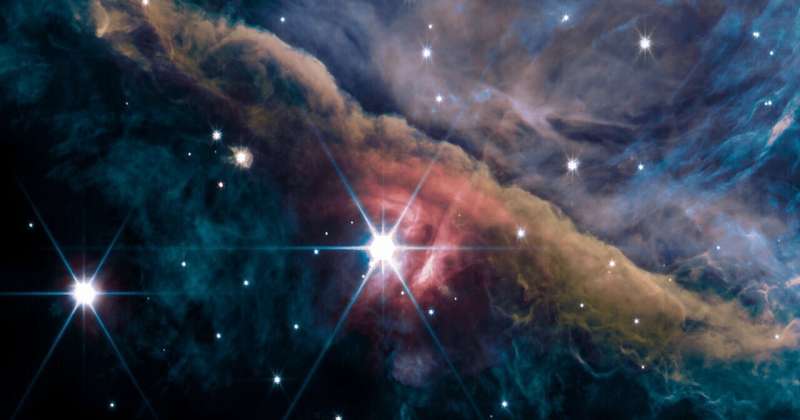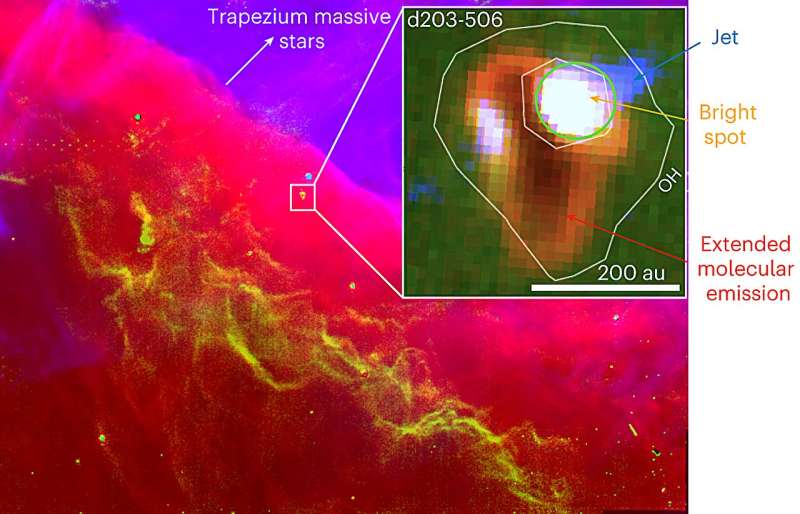
[ad_1]

The inner region of the Orion Nebula as seen by the James Webb Space Telescope’s NIRCam instrument. This image was obtained on September 11, 2022 with the James Webb Space Telescope NIRCam instrument. Several images were combined with different filters to create this composite image: F140M and F210M (blue); F277W, F300M, F323N, F335M, and F332W (green); F405N (orange); and F444W, F480M, and F470N (red). Credit: NASA, ESA, CSA, PDRs4All ERS team; Salome Fuenmayor photo
An international team, including Western astrophysicists Alice Peters and John Comey, has discovered the destruction and re-formation of large amounts of water in the planet-forming disk at the center of the Orion Nebula.
The discovery was made possible by an original multidimensional approach combining observations from the James Webb Space Telescope (JWST) and quantum physics calculations.
The study, part of the PDRs4All Early Release Science Program and led by Université Paris-Saclay Ph.D. Student Marion Zinney, was published today I Nature Astronomy.
PDRs4All is one of 13 early release science programs selected by NASA to demonstrate JWST’s capabilities. International Consortium.
“It’s so impressive that in just a few pixels of observations, and focusing on a few lines, we can actually estimate that you have an entire ocean of water evaporating every month,” Peters, That’s what his co-principal investigator said. PDRs4 all and faculty member at Western Institute for Earth and Space Exploration. “This discovery was based on a small portion of our spectroscopic data. It’s exciting that we have so much data at my disposal and I can’t wait to see what else we can find.”
Water is an essential ingredient for the emergence of life as it is currently understood. On Earth, most of the water in our oceans formed long before the birth of the Solar System, at -250°C in the cold regions of interstellar space. However, some of this water could have been destroyed and re-formed at high temperatures (100–500 °C) when the Solar System was still a disk of gas and dust orbiting our young, newborn Sun.
To understand this mysterious recycling of water, the international astronomy team pointed JWST to ‘d203-506’, a planet-forming disk located in the Orion Nebula, the nursery of planetary systems. gave Intense ultraviolet radiation Prepared by Big stars d203-506 leads to the destruction and re-formation of water, making it a true interstellar laboratory.
“The James Webb telescope is incredibly powerful. We’re not talking about finding a needle in a haystack for this discovery. It’s a needle in a haystack made of needles,” said Comey, a physicist. and is a professor of astronomy and a core member of PDRs4All.

JWST NIRCam composite image of the Orion Bar in the Orion Molecular Cloud. Credit: Nature Astronomy (2024). DOI: 10.1038/s41550-024-02203-0
What a leap
Collaboration with quantum dynamics experts at the Madrid Deep Space Communication Complex (Spain) and the Leiden Observatory (Netherlands) was key to understanding how the formation and destruction of molecules more than 1,000 light-years away can be observed.
When water is destroyed by ultraviolet light, a hydroxyl molecule is released, followed by the emission of photons that travel all the way to JWST. In total, it is estimated that the equivalent of all of Earth’s oceans worth of water is lost and replenished each month in the d203-506 system.
But the story does not end there. By a similar mechanism, JWST has revealed that hydroxyl, a key intermediate in the formation of water, is also produced in abundance from atomic oxygen. some of Water The formation of Earth’s oceans could have undergone such a cycle.
More information:
Marion Zannese et al, OH as a probe of hot water circulation in planet-forming disks, Nature Astronomy (2024). DOI: 10.1038/s41550-024-02203-0
Provided by
University of Western Ontario
Reference: Researchers Destruction Oceans Worth Month in Orion Nebula (2024, February 23) Retrieved February 23, 2024 from https://phys.org/news/2024-02-destruction-oceans-worth-month-orion . html
This document is subject to copyright. No part may be reproduced without written permission, except for any fair dealing for the purpose of private study or research. The content is provided for informational purposes only.
[ad_2]



hajkdi
Your article helped me a lot, is there any more related content? Thanks!